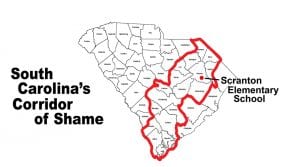The Nation’s Report Card is in, and South Carolina schools rank among the nation’s worse.
The state fell on every category of the education assessment, pushing already low national rankings even lower.
Melanie Barton is the executive director of the South Carolina Education Oversight Committee, a group that reviews school achievement and advises state officials on how to make improvements.
“How did we slip so far?” Barton said. “I was expecting maybe a slight dip in fourth grade. I wasn’t expecting to move off the cliff.”
Fourth graders dropped in reading and math, eighth graders lagged behind the national average and both grades scored significantly less than over 30 other states.
In a state that recently spent $500,000 to launch an ad campaign to promote South Carolina schools, officials are now wondering what they can do differently.
The ‘Corridor of Shame’
Scranton Elementary is located inside one of the 36 school districts that make up the state’s so called “Corridor of Shame’ – an area of inadequately funded schools along Interstate 95.

Property values in South Carolina town’s like Scranton are low, which makes less money available for school resources.
“They can’t help where they live,” Allana Prosser, Scranton’s principal said, “but they don’t get the same things other kids do.”
South Carolina is also facing a teacher shortage, but Prosser says Scranton is not affected.
The school is science, technology, engineering and mathematics (STEM) accredited and a two-time finalist for the Palmetto’s Finest award, which measures the impact a school makes on its students.
“We want people to realize, hey, we can do it too,” Prosser said. “We may not have the money… [or] the facility, but we can do it too.”
Despite consistent growth, students here still tend to score lower on standardized tests like the SC College-and Career-Ready Assessments, which is held near the end of the school year.
“I’m nervous for it because I’m nervous that I’ll get a bad grade,” Johnathan, a fourth-grade Scranton student, said.
In response, the state has made a major push to improve early childhood literacy, including additional funding.
“Now we have to really focus on the quality of the experience that students are getting,” Barton said, “and we’ve got to do a better job of recruiting and retaining high quality teachers. Something’s not right, but we need to fix it.”




